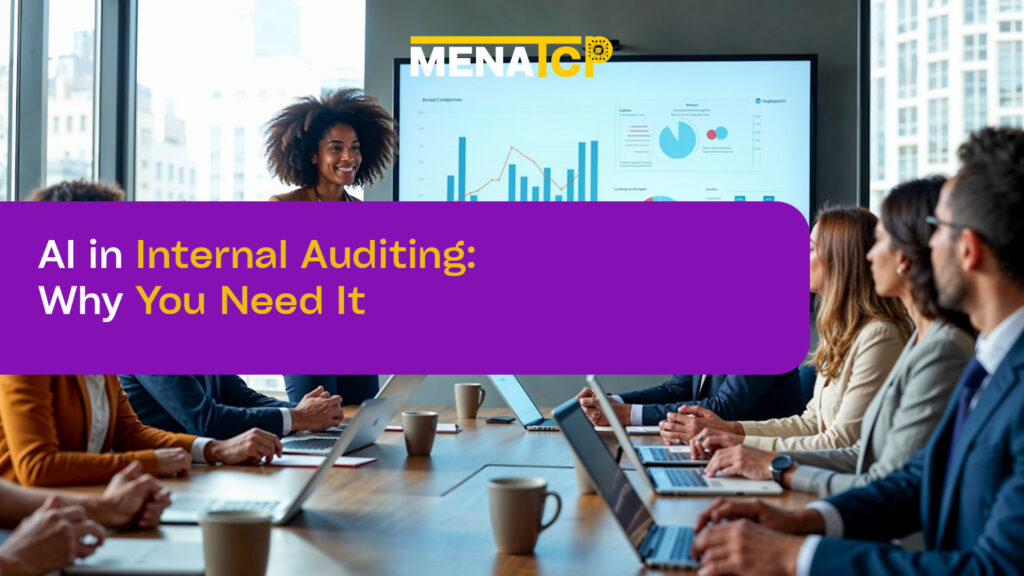
The use of Artificial intelligence in accounting and finance and specially in internal audit is transforming how tasks are being performed from changing the scope of work to changing and automating tasks entirely. That being said, it is apparent that staying on top of the competition needs of you to stay updated with the latest AI advancements especially in the field of finance to get the benefits of AI in accounting and finance In this blog we are going to discover how Artificial intelligence (AI) is transforming internal auditing by enhancing efficiency and effectiveness in several key areas:
Automating Routine Tasks
AI streamlines repetitive tasks such as data collection, documentation, and report generation, allowing auditors to focus on complex, strategic activities.
Advanced Data Analysis and Anomaly Detection
Continuous Monitoring
AI-powered tools facilitate real-time monitoring of financial data, transactions, and internal controls, enabling auditors to promptly detect and address issues as they arise.
Predictive Analytics
By analyzing historical data, AI can forecast future financial trends and potential risks, allowing organizations to proactively mitigate risks and make informed decisions.
Enhanced Reporting Accuracy
AI generates insightful, customized reports, improving auditors’ ability to effectively communicate findings to management and stakeholders, and highlighting areas requiring immediate attention.
Fraud Detection
AI algorithms are adept at recognizing patterns associated with fraudulent activities, flagging suspicious transactions, and minimizing the risk of financial loss.
The integration of artificial intelligence in accounting and finance offers numerous benefits, including increased efficiency, improved accuracy, and enhanced risk management. As AI continues to evolve, its role in internal auditing is expected to expand, further revolutionizing the field.
Audit Planning and Project Management
Leveraging artificial intelligence in accounting and finance, internal auditors can automate numerous tasks involved in audit planning and project management. For instance, AI systems can confirm that recurring reviews are scheduled and properly staffed, calculate costs and compare them against budgets, dispatch notifications to the appropriate stakeholders, detect over-scheduled personnel, and update project management tools—all of which streamline the process and reduce manual errors.
Fieldwork
In the fieldwork phase, AI algorithms excel at identifying complex patterns and anomalies across large datasets. By handling multiple search criteria at once, AI helps auditors pinpoint specific areas of interest, compare these findings to set benchmarks, consolidate relevant information, and present the results clearly. This technology not only highlights trends, patterns, and transactions that may indicate risk but also uncovers best practices and correlations that reveal centers of excellence within an organization. Additionally, AI facilitates the creation of dynamic presentations for status updates, converts audio into text for narrative reports, and even transforms text into audio for voice messaging demonstrating the tangible benefits of AI in accounting.
Risk Assessment
In risk assessment, AI significantly eases the burden of populating risk registers, a traditionally time consuming task. By integrating insights from previous audits, leveraging data analytics, and drawing on historical reports, AI can automatically populate risk registers, quantify complex risk factors, and update risk ratings
Operational Quality and Fraud
Artificial intelligence in accounting and finance also enhances operational quality and fraud detection. AI can swiftly detect and analyze patterns, anomalies, and potential risk areas, enabling auditors to identify errors, omissions, duplicates, and mis-categorized items. By organizing these findings based on operating unit, product line, or timeframe, AI can flag higher risk areas for further review. Moreover, AI effectively identifies transactions that bypass established controls, deviate from preset rules, or stray from expected sequences—significantly reducing the manual effort traditionally required for these tests in processes like Purchasing, Accounts Payable, Accounts Receivable, and Travel and Entertainment.
Reporting
AI streamlines the reporting process by automating tasks such as data retrieval, collation, and the organization of standardized report elements. It further enhances report quality by checking grammar and flagging inconsistencies, resulting in faster, more impactful, and error-free reports. This automation allows auditors to concentrate on more strategic and creative aspects of their work, highlighting yet another benefit of AI in accounting.
Compliance Monitoring
Finally, AI supports compliance monitoring by efficiently analyzing vast datasets to detect patterns indicative of non-compliance. With adjustable triggers and tiered notification systems, AI not only tracks the resolution of compliance issues over time but also provides timely reminders when corrective actions fall short of organizational expectations.
Overall, the benefits of AI in accounting are profound. By automating routine tasks, enhancing data analysis, and improving both risk assessment and compliance monitoring, artificial intelligence in accounting and finance is revolutionizing internal audit processes empowering auditors to deliver more accurate, efficient, and actionable insights.
© MENATCP, 2025. All Rights Reserved | Developed by MG Digital